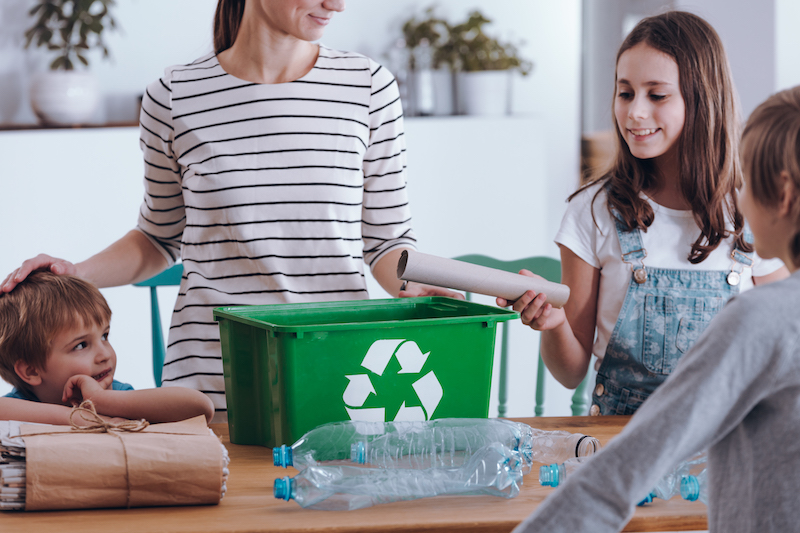It is common knowledge that our planet has limited resources. This implies that we should use these limited resources available as sparingly as possible. The best way to utilise the natural resources more sensibly is to limit the number of things that we use in our daily lives. It would also be a good idea to reuse things instead of throwing them away. If we cannot reuse or reduce, then perhaps recycling them should be the best option.
When you throw your old household items away, you might feel relieved to get rid of them. Unfortunately, you might be creating even a bigger problem than just filling a landfill. A landfill can be horribly polluting. Landfills not only take up lots of space but are equally filled with lots of toxic chemicals. With the help of water pollution, this toxic soil can potentially cause havoc among the marine life.
So why should you recycle some of your household items?
There are a plethora of benefits for recycling your household items. Efficient recycling not only reduces the amount of waste that goes to the landfills, but it results in energy savings too. Simply put, it saves materials, significantly cuts down pollution, eliminates the need to incinerate and helps make our environment more appealing and attractive. You have every reason to recycle!
Which materials can be recycled?
Thanks to the advancements in technology, virtually all types of materials can be recycled. Check out our ultimate recycling guide for everything you need to know about recycling. Materials that can be recycled include:
- Kitchen and garden waste
- Cardboard and paper
- Metal
- Wood
- Glass
- Plastics
- Oil
- Water
Despite the fact that a number of homeowners are very much aware of the benefits of recycling, very few households take the initiative to recycle their household items. Convenience is the name of the game when it comes to an efficient recycling process. When done right, it can be extremely rewarding, and every member of your family can take part in it.
If you are unsure of what needs to be recycled, kindly visit our yellow bin recycling guide. You’ll be able to get a complete rundown on the items that you can dispose into your yellow bin at home. What’s more, you’ll get directed to some of the recycling areas where one can safely dispose of light bulbs, batteries as well as other hazardous rubbish which should not be kept in your trash.

So how can you sort your household items effectively?
The sorting process may seem like a lot of work, but once you have created a working system, it will only take a few days to put it into practice. Even though you are highly encouraged to make good use of your local recycling centre because it is a sign of good waste management, sorting your items is equally critical. Sorting your household rubbish not only makes you think twice about what you may be just about to throw away but allows you to think how you can reuse some of these items.
Arguably, the simplest and the most straightforward method to effectively sort rubbish at home is to have separate bins. You’ll only need to label them appropriately so that it becomes clear which bag is for metal, plastic, wood, paper among others. Check out below on how to sort your household rubbish effectively.
- A bin for plastic waste – This should contain items such as film and bags, empty PET bottles, containers and boxes. When your bin is full, you can deliver it to your local collection centre for plastic waste.
It is also advised that you should have a separate bag for PET bottles which you can recycle at your plastic bottle collection point in exchange for money.
- A bag for glass waste – It should contain all types of glass jars, bottles and containers.
- Cardboard and paper waste – Put all old books, note papers, magazines, newspapers and other cardboard products.
- Metal waste bin – Put all types of metal products as well as metal packaging including tins and cans. When full, you can take it to the nearest metal recycling centre or you can get Paul’s Rubbish Removal to pick it up for you at your convenience.
- Battery and accumulator waste – This should house all kinds of accumulators and batteries of your various electrical appliances. Should be delivered to any local specialised battery collection container. Read more about our battery recycling guide.
- Potentially dangerous waste – These include used car tires, oil filters and perhaps industrial oils. Should be taken to a point of collection of environmentally hazardous items.
- Medical waste – This should contain your medicine that has expired. Put them in a separate bag and ensure the tops are firmly sealed. They can be returned to the nearest medical centre.
Reusable items such as clothing, shoes, furniture and any other biodegradable waste can be donated to a charity. You can also set up a small compost heap where you can dump them. This will result in a rich humus which enhances soil productivity in your garden.
For all your household recycling and disposal needs, call Paul’s Rubbish Removal on 0407 125 125. We have been proactively recycling and disposing of our waste in Sydney to help protect and preserve our environment. We know that household waste can have a considerable impact on marine life. Together we can make the world a cleaner and better place!







